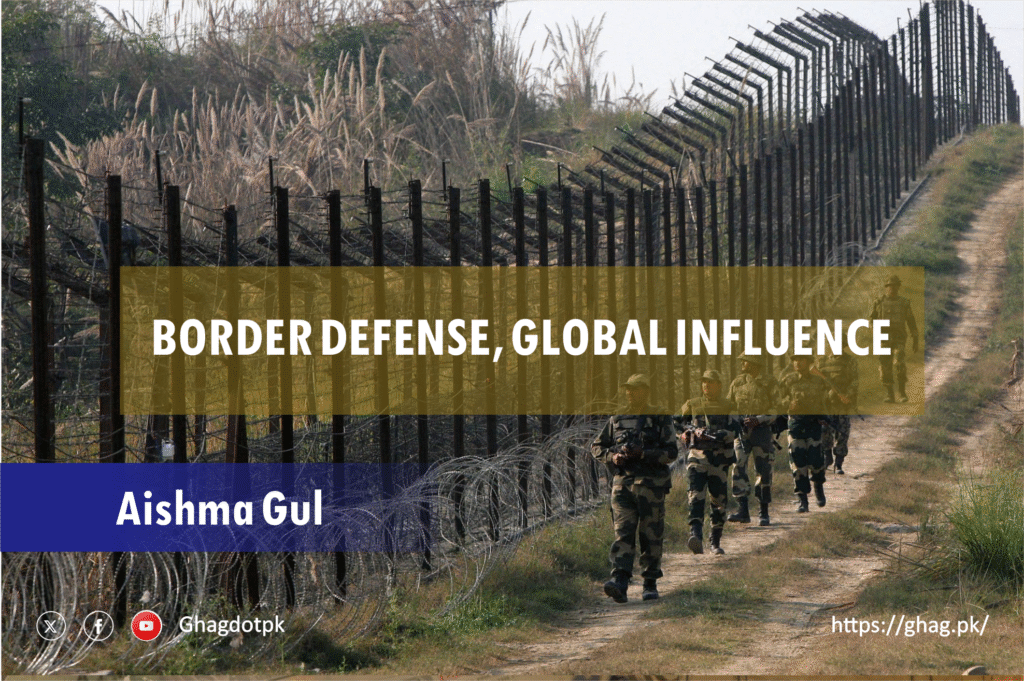By Aishma Gul
“With grit and talks, Pakistan shapes its future.”
When Pakistan’s security forces halted a major infiltration attempt at the Pak-Afghan frontier—neutralising 30 terrorists in one swift move—they reminded us just how real the threat is and how sharp our defence teams can be.
Successful Counter-Terror Operation
Between July 1 and 3, 2025, troops from the Pakistan Army and Frontier Corps spotted suspicious activity around Hassan Khel in North Waziristan. Acting on fresh intelligence, they struck quickly, taking out 30 militants and uncovering stockpiles of arms and explosives.
Using on-the-ground tips alongside drone feeds, the teams pulled off a precise hit—seizing IEDs, ammunition and explosive vests. That not only stopped a planned assault but also crippled the network behind it. It’s a reminder that weaving together human reports, advanced technologies and signal intercepts gives our forces an edge, keeps civilians safe and builds public trust.
Rising Terror Incidents: The June Toll
June 2025 saw 78 terror attacks across the country, leaving 100 dead—both civilians and security personnel—and injuring 189, a top think tank notes. In response, our forces took down 71 militants and rounded up 52 suspects. So far this year, 502 attacks have claimed 737 lives and wounded 991, hitting everything from military bases to crowded marketplaces.
Those numbers show extremist groups are still active, but they’re losing ground. Quick-reaction teams and neighbourhood policing have forced militants into desperate, poorly planned strikes—ones our forces are stopping faster than ever.
The Drone Arms Race: Regional Security Implications
After May’s drone skirmishes, India rolled out a ₹20 billion ($234 million) fund to kickstart its own UAV industry. Defence Secretary Rajesh Kumar Singh put it plainly: “We need to double down on our indigenisation efforts to build an effective military drone ecosystem.”
For Pakistan, that’s a clear signal. We must sharpen our anti-drone defences and speed up work on our own unmanned systems. Partnerships with China and Türkiye have already laid a foundation—now it’s time to build on it, protecting vital sites and keeping the skies secure.
Diplomacy in Action: UN Security Council Presidency
On July 1, 2025, Pakistan took the rotating presidency of the UN Security Council for the first time since 2013. Ambassador Asim Iftikhar Ahmad said:
“Pakistan undertakes this responsibility with a deep sense of purpose, humility and conviction… Our approach will remain anchored in the purposes and principles of the UN Charter, respect for international law, and a steadfast commitment to multilateralism.”
All month, we’ll host debates on “Promoting International Peace and Security through Multilateralism” (July 22) and “UN Cooperation with Regional and Sub-Regional Organisations: The OIC” (July 24), led by Deputy PM and Foreign Minister Ishaq Dar. We’ll also chair the Taliban Sanctions Committee and serve as vice-chair of the Counter-Terrorism Committee, showing the world our security know-how.
Geopolitical Shift: Russia’s Recognition of the Taliban
On July 3, 2025, Russia became the first major power to recognise the Taliban government in Kabul, accepting its new ambassador. Afghan FM Amir Khan Muttaqi called it “a historic step” that he hopes others will follow. Yet some analysts caution that normalising ties with the Taliban risks legitimising impunity and undermining global security.
For Pakistan—facing cross-border militancy along a long, porous frontier—this opens doors for joint counter-terror work but also risks emboldening extremists who may exploit fresh diplomatic ties.
Agricultural and Food Security Cooperation: A Soft-Security Dimension
Security isn’t just about rifles and patrols. On July 4, 2025, Federal Minister Rana Tanveer Hussain urged deeper cooperation with Egypt on dryland farming, climate-smart tech and biotech at an Egypt National Day event in Islamabad. He pointed to drip-irrigation projects, advanced seed trials and research exchanges as “a meaningful partnership” to boost our resilience against changing weather.
By strengthening rural economies, Pakistan tackles the root causes of unrest. It’s proof that real security pairs patrols with policies—and food with force.
Pakistan’s security challenges weave through the rugged Afghan frontier, thread into global diplomacy, and even extend into farms and fields. From stopping infiltrations to steering UN debates, and from counter-terror raids to agricultural pacts, our approach is living proof that national stability relies on both hard and soft tactics—always ready, always adapting.






